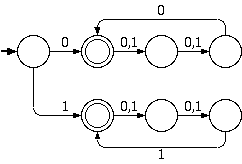Consider the following NFA over the alphabet {0,1}:
- Convert this NFA to a minimal DFA.

- Write a regular expression for the set the machine accepts.
[0+(0+1)(1+00)*01]*(0+1)(1+00)*
- Write a linear grammar where each right side is of the form aB or a.
A -> 0A | 0B | 1B
B -> 1B | 0C | e
C -> 0B | 1A
Draw a finite state machine that accepts the complement of the language accepted by the non-deterministic machine below:
answer:
Determine and prove for each set below whether it is Regular or not. Be careful.
- The set of all strings in which every third symbol is the same as the first symbol in the string.
REGULAR. This language can be accepted by the following NFA:

- The set 1m0n1m+n, for m and n greater than or equal to one.
NOT REGULAR by the pumping lemma. Let p be the pumping length and consider the string s=1p0p12p. Now we try to break it up into s=xyz. Since |xy|<=p and |y|>0, y can only contain 1s. When we pump the string once we get xy2z = 1p+|y|0p12p which is not in the language. This contradicts the pumping lemma, so the language is not regular.
- The set of strings where each string has an equal number of 0ís and 1ís, and every prefix of the string has at most one more 0 than 1, and at most one more 1 than 0.
REGULAR. This language can be accepted by the following NFA:

Determine whether Regular sets are closed under each of the operations below. Prove your answers by an explanation and/or example or counterexample.
- Even(L) is the set of all strings x in L such that |x| is even.
CLOSED Even(L) is just the intersection of L with a DFA which accepts strings of even length. Since L and this DFA are both regular, and regular sets are closed under intersection, regular sets must also be closed under Even.
- Triple(L) = {x | x=uvw, such that u, v, w are in L, and |u| = |v| = |w|}.
NOT CLOSED by counterexample. Consider the language A = 0*1. Triple(A) has the form 0n10n10n1 where n>=0. If we assume pumping length p and try to pump the string s=0p10p10p1 which is in this language, we get s=0p+|y|10p10p1 which is not. Since A is regular and Triple(A) is not, the set of regular languages is not closed under Triple.
Give a decision algorithm to determine whether a regular language L1 has one or more strings in common with the language described by the regular expression [00 + 11 + (01 + 10)(00 + 11)*(01 + 10)]*.
- Obtain a DFA for L1
- Obtain a DFA for the regular expression [00 + 11 + (01 + 10)(00 + 11)*(01 + 10)]*
- Intersect the two DFAs.
- If the result accepts anything, accept; Otherwise reject.


